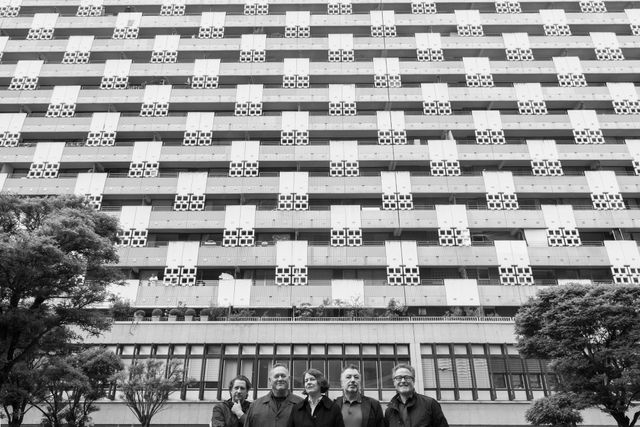Concerts
Ein Haufen Scheiß und ein zertrümmertes Klavier | Vincent: Krieg und Gegenwart
F.S.K., Trümmer

F.S.K. pays homage to the futurist Luigi Russolo and his “art of noise,” which integrated the noise of industrial cities and the new war machines of the First World War. In their contemporary punk rock opera, the post-punk band Trümmer pursues the path of a young man in the armed conflicts of the present.
Vincent: War and the Present (premiere)
Vincent is in his mid 20s and lives in Berlin. He drifts between parties, drugs and gallery openings, everything appears to be in motion. However, he is standing still. In their punk rock opera Vincent, Trümmer follow the story of someone who went out into the world and never came back. Someone who got caught up in a conflict that no longer has any fronts, where existence and (non)belief are placed in question. The live performance of a concept album with ten newly composed songs on the seductive power of radical ideologies in a present without utopias.
Music and text: Trümmer
Vocals & guitar: Paul Pötsch
Bass guitar: Tammo Kasper
Guitar & synthesizer: Helge Hasselberg
Drums: Maximilian Fenski
Stage: Ariane Litmeyer & Anna-Lena Völker
Trümmer – liberatingly showy, intoxicating, euphemistic Rock and Roll is the starting point and musical vernacular of the formation Trümmer, established in 2012. Instantly recognisable thanks to the voice of front man Paul Pötsch and the direct and rebellious lyrics, Trümmer perform electrically amplified music with its roots in punk, sharing the euphoria of the moment with the audience. The band, now grown to a quartet, has played at festivals such as Melt!, Dockville, Haldern Pop and Deichbrand, as support for national and international stars such as Dinosaur Jr., Casper, The 1975, and completed its first German tour as headline band. Their debut album Trümmer was released in August 2014 on PIAS Germany. This was followed by countless interviews, awards (Hamburg Music Award, German Record Critics’ Award) and a nomination for the ECHO Critics’ Award.

Ein Haufen Scheiß und ein zertrümmertes Klavier
F.S.K. (Freiwillige Selbstkontrolle) is an art school band from Munich that formed in 1980 in the editorial office of the underground magazine Mode & Verzweiflung and issued disturbing slogans of a new dissidence like: Wir sagen Ja zur modernen Welt (we say yes to the modern world) and Heute Disco, morgen Umsturz, übermorgen Landpartie (disco today, coup tomorrow, a country outing the day after). The Italian Futurists’ idea to flood Venice was joyfully appealing to them so they made the serious demand to convert theaters into parking garages (Theater zu Parkhäusern). The futuristic development of so-called noisemakers (a productive modification of the sounds of industrialized cities as well as the completely new war machines of World War I) carried a key moment of deviant pop music into its emerging discourse: clipping, distortion, Bring the Noise.
The hedonistic partisanship of the band F.S.K. particularly affected its eclectic zigzags (from post punk to rhythm & blues, country & western to techno soul) and morphed into yet another new, postmodern shape in the 1980s in England (where John Peel was a prominent promoter of F.S.K.) and in the 1990s in the US, where their music faced the transatlantic feedback of the songs of American occupying forces. Back in Germany their music took on more abstract forms that were described as Cubist with the latest album Akt, eine Treppe hinabsteigend (nude descending a staircase): aesthetic lines that move from Luigi Russolo and Iannis Xenakis, Sun Ra and Larry Heard to the glitches of the latest bass music. In the traditional lineup of a rock and roll band, today F.S.K. musically executes all of these threads.
The band still consists of the four founding members Justin Hoffmann, Thomas Meinecke, Michaela Melián and Wilfried Petzi. Carl Oesterhelt joined them in 1991.
Their piece Ein Haufen Scheiß und ein zertrümmertes Klavier (a pile of crap and a shattered piano) developed for Haus der Kulturen der Welt explores productive axes between destruction and deconstruction (paying tribute to Luigi Russolo).